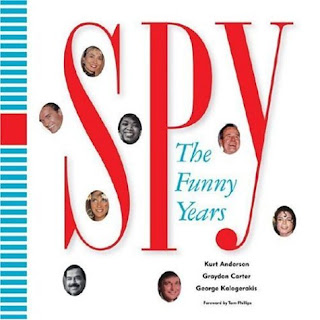Spy was a great magazine in the late '80s, a fine magazine in the early '90s, and a shambling wreck of itself in the late '90s -- when it started, it was one of the earliest manifestation of the modern media self-fascination (and self-loathing, and endless self-reflexivity) and of the snarky, iconoclastic tone that later became the default mode of the Internet. And Spy: The Funny Years
Although, since Spy was so much of its time -- picking on Trump and Leona and Ovitz and the rest of the late-80s vintage crew of unpleasant New Yorkers -- reading it now is an exercise in quaintness and nostalgia, full of "remember that?!" moments that leech the honest bile of its original power. That's inevitable, of course -- last year's short-fingered vulgarian is this year's TV superstar -- but it does tend to make Spy seem cuter and less cutting than it really was.
This book is written by George Kalogerakis, one of the original Spy crew, with regular kibitzing and oversight by the original editorial duumvirate, Kurt Anderson and Graydon Carter. The balance between old and new is skewed towards the old -- Spy was so crowded with what we now call "content" that a snippet from those pages has as many words as a page or two of the coffee-table-book prose of the main narrative. And so Spy: The Funny Years has "pictures" with more words than the pages they sit on, and a number of full articles, all of which take longer to read than two or three chapters put together. It's good stuff, sure, but Spy: The Funny Years feels more like an anthology of the Best of Spy, with historical notes, than like a history of Spy with illustrations. But what can you expect when you let such word-struck folks have their heads?
If you were there at the time -- or soon afterward; I only graduated college and started working in New York in 1990, around or just after the peak of Spy -- then this will remind you of the things we were all disgusted by then, and how we found out about them. If not, it's an interesting snapshot of a time that seemed the height of bad taste and the self-indulgence of wealth then...only because we didn't realize how much worse things could get.

No comments:
Post a Comment